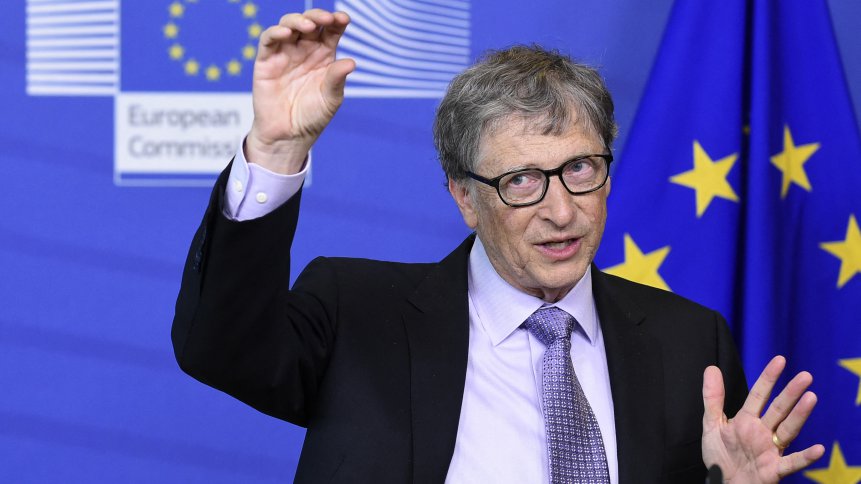Microsoft makes cloud changes to avoid EU antitrust clash

Founder of Microsoft and chairman of Breakthrough Energy Ventures, Bill Gates during a press conference at EU headquarters in Brussels. (Photo by JOHN THYS / AFP)
Microsoft has disclosed that it plans to loosen its licensing requirements with cloud companies as it seeks to fight off regulators after growing complaints of monopolistic practices. The tech titan is trying to avoid a replay of its epic battles against EU and US antitrust enforcers in the late 1990s that ended in major court cases and big fines.
At the heart of the controversy is a 2019 decision that made it more expensive for cloud companies to access Microsoft’s Office 365 when they were running through data centers operated by rivals, such as Amazon or Alibaba. European cloud companies including French cloud computing services provider OVHcloud filed an antitrust complaint against Microsoft Corp to the European Commission, the EU’s antitrust regulator, accusing Microsoft cloud unit Azure of abusing its dominant position, undermining fair competition, while limiting consumer choice in the cloud computing services market.
They also said the user experience was made worse and that there are incompatibilities with certain other Microsoft products when not running on Azure, the company’s own data operating system. Last month, Italian cloud provider Aruba SpA came forward to admit that it also has issues with Microsoft practices in bundling services in the region and undercutting competitors.
Although the complaints come at a time of recent heightened government oversight in the cloud market, Microsoft in particular has been fortunate enough to have not been at the center of attention, unlike its fellow rivals. That is mainly due to its ‘playing-it-safe’ nature following its own antitrust battles two decades ago when the US Department of Justice and the EU sued Microsoft for its business practices. But now some of Microsoft’s customers and a handful of its fiercest rivals are giving the software and cloud computing behemoth a renewed focus in the European fair markets spotlight.
“We’re just changing the licensing terms so that at their heart, cloud providers that are based in Europe can run Microsoft software pretty much the same way Microsoft can,” company president and vice-chair Brad Smith told reporters this week in Brussels. Smith insisted that the changes were a “first step” and that “we probably have some more things that we’re going to need to do.”
Microsoft over the years accumulated fines of 1.6 billion euros in the EU for anti-competitive practices regarding its Internet Explorer browser, Windows operating system, and software licensing rules. Besides the complaint by OVHcloud and other unnamed companies, there have also been other complaints in recent years within the region itself, alleging Microsoft for bundling its cloud products in a manner that complicates and made things difficult for competitors. For instance, in 2020, San Francisco-based business-messaging app Slack Technologies Inc. complained to the EU about Microsoft’s bundling of its rival Teams workplace collaboration product with its popular Office software.
The Redmond, Washington state-based company is also the subject of an earlier 2021 complaint to the European Commission by a different set of companies led by the German Nextcloud. They denounced the “ever-stronger integration” of Microsoft cloud services, which it said complicated the development of competing offers.
“The changes we are making today on behalf of European Cloud Providers are grounded in feedback we heard in meetings with several of those providers across Europe,” Smith outlined in his Microsoft blog detailing the licensing alterations as well as Microsoft’s sweeping strategy in Europe. “I joined other senior Microsoft business leaders so I could participate myself in remote meetings with the CEOs of two European providers.
“Some of the most compelling feedback for me personally came from a CEO who said that he felt that he “was a victim of friendly fire in Microsoft’s competition with Amazon.” It was hard to hear this – but he was right,” Smith admitted. “Over the past few years, our focus on competing with the largest technology providers has resulted in us not being as attentive to the impact on our cloud provider partners. We are making changes to remedy this, beginning today.”
Amidst the complaints, the EU has just finalized legislation that would designate several large US-based companies, including Microsoft, as “gatekeepers” that would need to abide by a new set of rules for how they deal with competitors and consumers. In contrast, reports are claiming that the US is pressing the EU to revise the rules and make them focus on other tech firms too, not just American companies.
With reporting from © Agence France-Presse
20 June 2024










